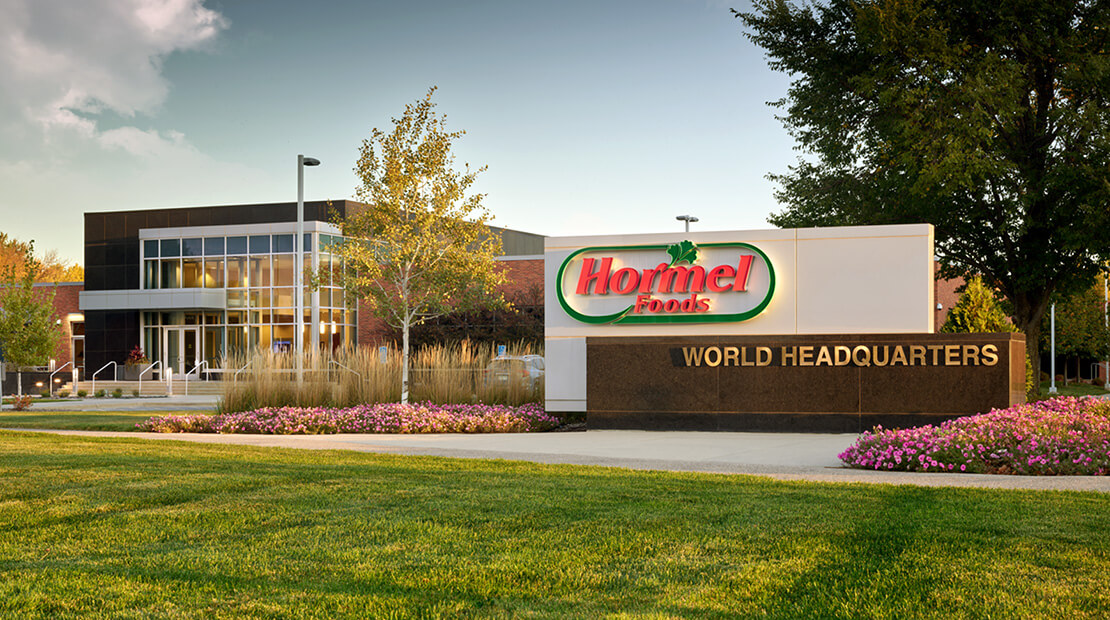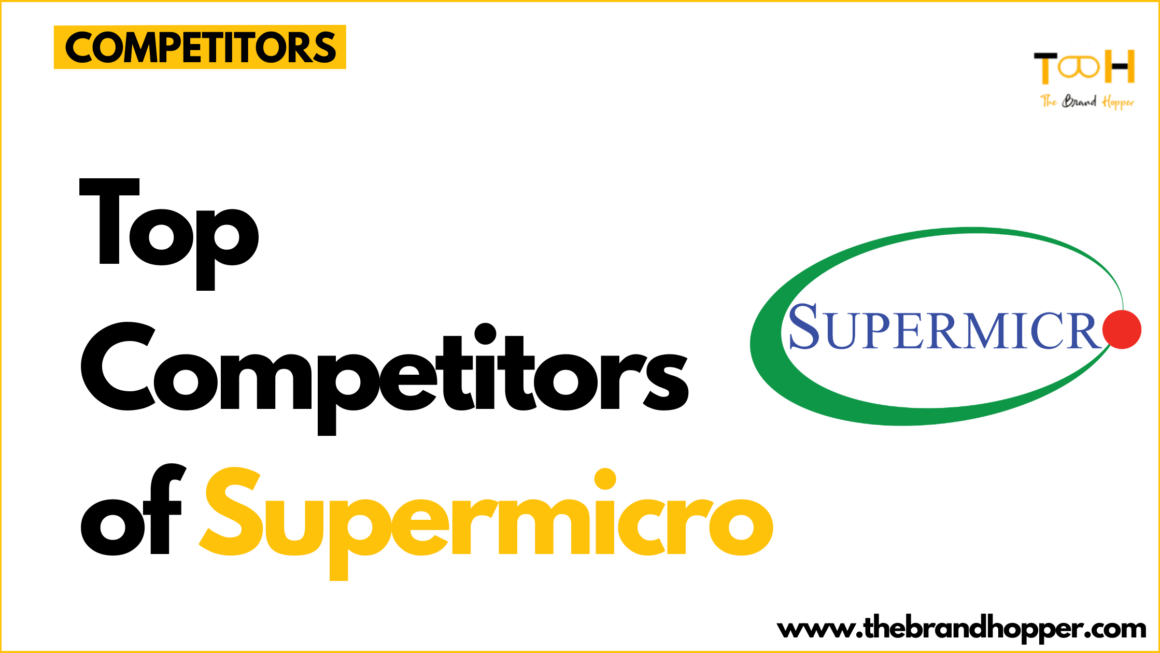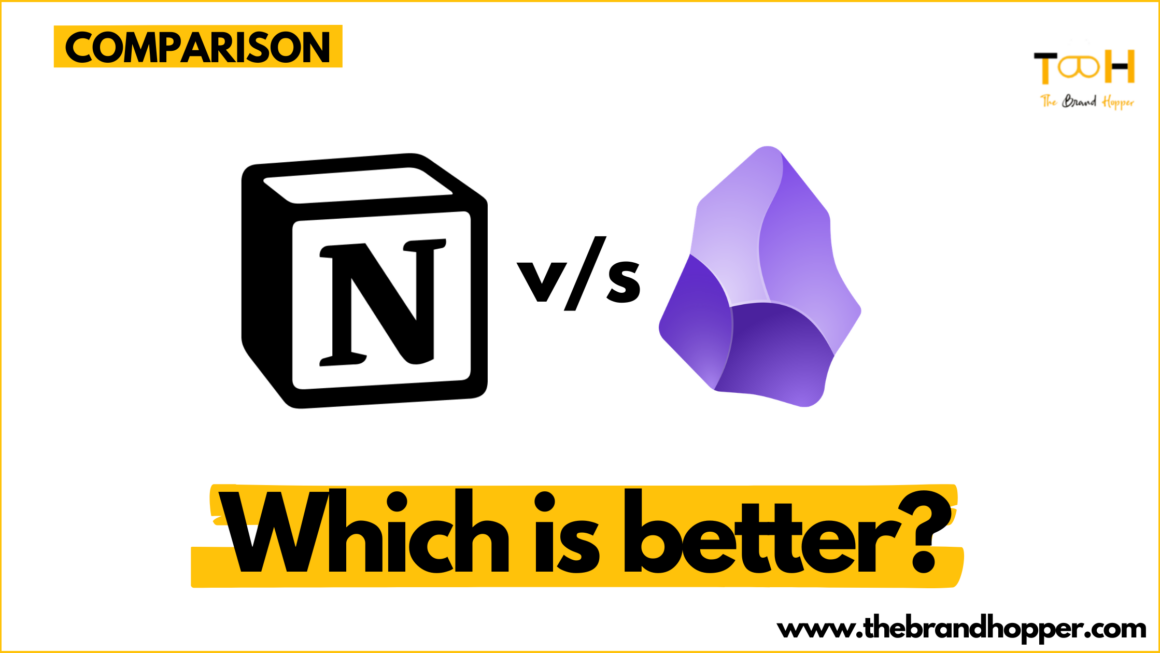Hormel Foods, a globally recognized American company, has a long-standing reputation for delivering high-quality food products across a variety of categories. Founded in 1891 by George A. Hormel in Austin, Minnesota, Hormel Foods has evolved from its modest beginnings as a local meat-packing business into a multinational corporation known for its diverse portfolio of products, innovation, and sustainability efforts. The company is most famous for its SPAM® brand, which has become an iconic American product, but Hormel’s reach extends far beyond canned meats, with a portfolio that includes premium meats, grocery products, and refrigerated foods.

A Century-Old Legacy of Quality and Innovation
From its inception, Hormel Foods has remained committed to providing high-quality, innovative food products to consumers worldwide. Initially, the company focused on packing and processing fresh pork, but it soon expanded its operations to include canned meats, which became a crucial part of its offerings. The introduction of SPAM® in 1937 marked a turning point for the company, as the product gained immense popularity during World War II due to its long shelf life and convenience. Today, SPAM® remains one of the company’s best-known brands, with over 9 billion cans sold worldwide. The ability to adapt and innovate has been key to Hormel’s longevity and growth, allowing the company to remain relevant in a rapidly changing food industry.
Over the years, Hormel Foods has consistently embraced new technologies and trends to meet evolving consumer preferences. In the mid-20th century, the company was one of the first to introduce pre-cooked, ready-to-eat meals, a concept that catered to the growing demand for convenience in post-war America. Later, Hormel continued to expand its product lines, adding ethnic foods, organic products, and plant-based alternatives to cater to the changing tastes of modern consumers. The company’s ability to stay ahead of food trends and adapt its offerings to meet diverse consumer needs has played a crucial role in its sustained success.
Diversified Product Portfolio
Hormel Foods has strategically diversified its product portfolio to include an array of brands that cater to different market segments. The company operates under various brand names, including Jennie-O, Applegate, Dinty Moore, Skippy, Justin’s, and more. Each of these brands offers products that appeal to different demographics and dietary preferences, from plant-based proteins to organic and natural products. This diversification has allowed Hormel to remain competitive in a crowded market and expand its global presence.
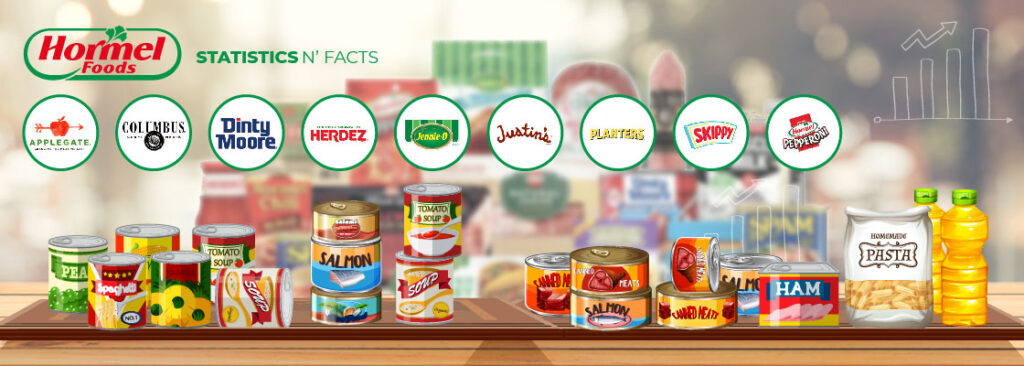
The Jennie-O brand, for instance, is a leader in the turkey products category, offering ground turkey, turkey sausages, and whole turkeys. As more consumers seek healthier, leaner protein options, Jennie-O’s offerings have become increasingly popular. Meanwhile, Applegate is a pioneer in the natural and organic meat sector, offering antibiotic-free and humanely raised meat products that appeal to health-conscious and environmentally aware consumers. Hormel’s acquisition of Skippy, the second-largest peanut butter brand in the United States, allowed the company to strengthen its position in the grocery category, while Justin’s is known for its premium nut butters and organic snack foods, further expanding Hormel’s reach in the healthy snack market.
Global Expansion and Acquisitions
Over the past few decades, Hormel Foods has steadily expanded its international presence through strategic acquisitions and partnerships. While the company’s core market remains the United States, it has made significant inroads into global markets, particularly in Asia, Europe, and Latin America. The company has prioritized acquiring businesses and brands that align with its long-term growth strategy and offer synergies with its existing portfolio.
One of the company’s most notable acquisitions was the purchase of Skippy peanut butter in 2013 from Unilever, which allowed Hormel to enter the international peanut butter market, particularly in China, where Skippy is a leading brand. This acquisition not only bolstered Hormel’s product offerings but also demonstrated the company’s commitment to expanding its global footprint. In 2017, Hormel acquired Fontanini Italian Meats and Sausages, a premium brand in the foodservice sector, further diversifying its portfolio and strengthening its position in the foodservice industry.
In 2021, Hormel Foods made one of its largest acquisitions by purchasing Planters, a leading brand in the snack nut category, from Kraft Heinz for $3.35 billion. This acquisition reinforced Hormel’s leadership in the growing snack category and aligned with the company’s strategy to offer products that meet consumers’ increasing demand for convenient, nutritious snack options.
Commitment to Sustainability and Corporate Responsibility
Hormel Foods has consistently prioritized sustainability and corporate responsibility in its operations. The company has set ambitious goals to reduce its environmental footprint, including reducing water and energy consumption, minimizing food waste, and increasing the use of renewable energy. Hormel is committed to sourcing ingredients sustainably and ethically, ensuring that its products are not only high-quality but also environmentally responsible.
In 2020, Hormel Foods was named one of the World’s Most Ethical Companies by the Ethisphere Institute for the 11th consecutive year. This recognition underscores the company’s commitment to ethical business practices, sustainability, and corporate social responsibility. Hormel’s dedication to supporting its communities, investing in renewable energy projects, and improving animal welfare standards has made it a leader in sustainability within the food industry.
Hormel Foods also emphasizes social responsibility, with a focus on hunger relief efforts and supporting communities where it operates. The company’s flagship corporate responsibility program, the Hormel Foods “Inspired Pathways” program, provides educational opportunities for the children of Hormel employees, helping to foster a more educated and empowered workforce for the future.
Innovating for the Future
As consumer preferences continue to evolve, Hormel Foods is focused on staying ahead of the curve through ongoing innovation in product development, marketing, and sustainability. The company has invested heavily in research and development to create new products that meet the needs of modern consumers, including plant-based and organic options, as well as innovations in food packaging and preservation. Hormel Foods also recognizes the growing importance of e-commerce and digital marketing, and it has made significant strides in expanding its online presence and direct-to-consumer offerings.
In conclusion, Hormel Foods is a dynamic and forward-thinking company with a rich history of innovation, a commitment to quality, and a strong sense of corporate responsibility. With a diversified product portfolio, a growing global presence, and a clear focus on sustainability, Hormel Foods is well-positioned to continue thriving in the ever-changing food industry. From its iconic SPAM® brand to its leadership in organic and natural foods, Hormel remains a trusted name in households around the world, offering products that meet the diverse needs and preferences of today’s consumers.
Marketing Strategies of Hormel Foods
Hormel Foods has established itself as a leader in the global food industry through a combination of innovative marketing strategies, brand diversification, and a commitment to quality and sustainability. Its approach to marketing reflects its understanding of evolving consumer preferences and its focus on meeting diverse needs across various demographics. Below, we explore the key marketing strategies that have fueled Hormel Foods’ success in detail:
1. Brand Portfolio Diversification
Brand Portfolio Diversification has been a key marketing strategy for Hormel Foods, allowing the company to expand its reach and appeal to a wider range of consumers. Hormel, traditionally known for its meat products, has strategically acquired and developed various brands to diversify its portfolio. For example, in 2013, Hormel acquired the Skippy peanut butter brand from Unilever for $700 million, marking its entry into the peanut butter market. This acquisition not only broadened Hormel’s product range but also provided access to new distribution channels and international markets.

Another significant move in Hormel’s diversification strategy was the acquisition of Justin’s, a natural and organic nut butter brand, in 2016 for $286 million. This purchase aligned with the growing consumer demand for healthier and more natural food options. Justin’s, known for its innovative flavors and environmentally conscious packaging, allowed Hormel to tap into the premium nut butter segment and appeal to health-conscious consumers. The company has since expanded Justin’s product line to include refrigerated protein bars and other snacks, further solidifying its position in the natural foods market.
Hormel’s brand portfolio diversification extends beyond acquisitions to include the development of new product lines under existing brands. For instance, the company launched Hormel Natural Choice in 2006, offering deli meats free from artificial ingredients and preservatives. This line has since expanded to include bacon, chicken strips, and snack packs, catering to consumers seeking cleaner label products. Additionally, Hormel has invested in plant-based protein alternatives, launching the Happy Little Plants brand in 2019. This move demonstrates Hormel’s adaptability to changing consumer preferences and its commitment to staying relevant in an evolving food industry landscape.
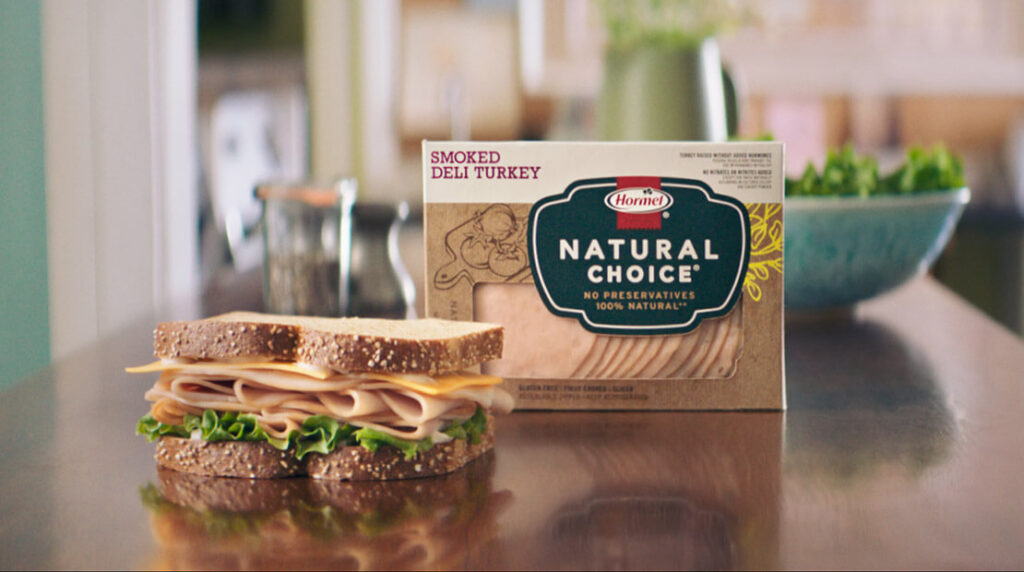
2. Emphasis on Sustainability and Corporate Responsibility
Hormel Foods has increasingly emphasized sustainability and corporate responsibility as a core part of its marketing strategy, recognizing the growing consumer demand for environmentally conscious and socially responsible brands. In 2012, Hormel launched its “Our Way” initiative, which outlined comprehensive goals for reducing environmental impact, improving animal welfare, and enhancing community support. As part of this program, Hormel set targets to reduce water usage, solid waste, and greenhouse gas emissions. By 2020, the company reported significant progress, including a 10% reduction in greenhouse gas emissions and a 13% reduction in energy use compared to its 2011 baseline.
One of Hormel’s most notable sustainability efforts is Project SPAMMY®, a nutrient-dense poultry product developed to help address childhood malnutrition in Guatemala. Launched in 2008, this initiative not only showcases Hormel’s commitment to social responsibility but also serves as a powerful marketing tool, demonstrating the company’s capacity for innovation in addressing global challenges. Hormel has donated millions of cans of SPAMMY® and has partnered with Food For The Poor and Caritas Arquidiocesana to distribute the product. This project has garnered positive media attention and helped improve Hormel’s reputation as a socially conscious corporation.
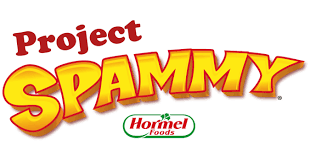
Hormel has also made strides in sustainable packaging, which has become a key focus of its marketing efforts. In 2020, the company announced its goal to make 100% of its packaging recyclable, reusable, or compostable by 2030. As part of this initiative, Hormel has introduced new packaging designs for several of its products. For instance, the company redesigned the packaging for its Natural Choice® deli meats to use 65% less plastic than traditional deli meat packaging. Additionally, Hormel has launched consumer education campaigns about recycling and sustainability, further positioning itself as an environmentally responsible brand. These efforts not only appeal to eco-conscious consumers but also help Hormel differentiate itself in a competitive market, turning sustainability into a unique selling proposition.
3. Health and Wellness Focus
Hormel Foods has strategically pivoted towards a health and wellness focus in its marketing efforts, recognizing the growing consumer demand for healthier food options. This shift is evident in the company’s product development and acquisition strategies. For instance, in 2018, Hormel acquired Columbus Manufacturing, Inc., a premium deli meat and salami company known for its cleaner ingredient lists and artisanal production methods. This $850 million acquisition allowed Hormel to strengthen its position in the growing millennial-driven market for premium, natural deli meats. The company has also expanded its Natural Choice® line, which offers products free from artificial ingredients and preservatives, directly appealing to health-conscious consumers.
Hormel’s health and wellness strategy extends to innovative product launches designed to meet specific nutritional needs. In 2019, the company introduced Hormel Vital Cuisine®, a line of high-protein, nutrient-dense products specifically formulated for cancer patients experiencing challenges with food and nutrition during treatment. This product line not only addresses a critical health need but also positions Hormel as a company committed to nutrition-based solutions for various health conditions. Additionally, Hormel has expanded into the plant-based protein market with its Happy Little Plants® brand, launched in 2019. This move aligns with the growing trend of flexitarian diets and consumers seeking to reduce their meat consumption for health and environmental reasons.
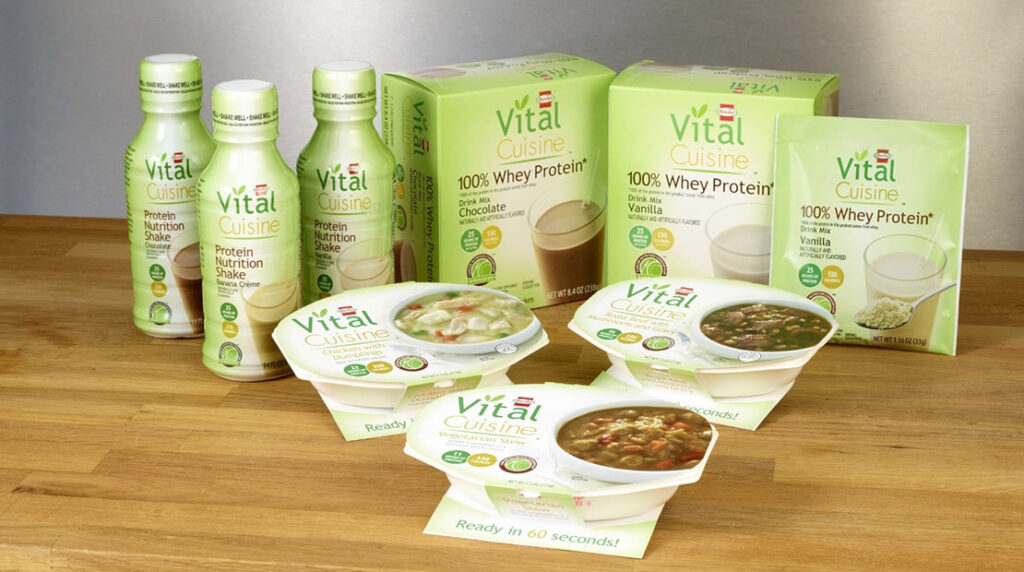
The company has also leveraged marketing campaigns to highlight the nutritional benefits of its products and educate consumers about healthy eating habits. For example, Hormel’s “Make the Natural Choice” campaign for its Natural Choice® brand emphasizes the products’ clean ingredients and absence of artificial preservatives. The company has also partnered with health and wellness influencers to promote its products and share healthy recipes. In 2020, Hormel launched the “Good Feeds Us All” campaign for its Hormel® chili brand, which focused on the product’s high-protein content and its role in a balanced diet. These marketing efforts not only promote specific products but also help position Hormel as a company committed to supporting consumers’ health and wellness goals, thereby enhancing brand loyalty and attracting health-conscious consumers.
4. Strong Digital Presence and E-Commerce Growth
Hormel Foods has significantly bolstered its digital presence and e-commerce capabilities as a key marketing strategy, adapting to the rapidly changing consumer shopping behaviors. In 2018, the company launched its e-commerce platform, HormelFoods.com, which allows consumers to purchase products directly from the company. This direct-to-consumer approach not only provides an additional sales channel but also allows Hormel to gather valuable consumer data and insights. The company has also invested in enhancing its presence on major e-commerce platforms like Amazon and Walmart.com. For instance, Hormel created unique product bundles and gift sets exclusively for online shoppers, such as the SPAM® Brand Variety Pack on Amazon, which has become a popular item among online consumers.
Hormel has leveraged social media platforms to engage with consumers and create brand awareness in innovative ways. A standout example is the SPAM® brand’s social media strategy, which has garnered a significant following through humorous and quirky content. The brand’s Instagram account, @SPAMbrand, has over 52,000 followers and regularly features creative recipes and pop culture references. In 2019, Hormel launched a viral marketing campaign for SPAM® called “SPAM® Can,” a play on the phrase “Yes, you can.” This campaign included user-generated content challenges on platforms like TikTok, encouraging consumers to create and share their own SPAM®-inspired content. The campaign not only increased brand engagement but also helped reposition SPAM® as a versatile and fun product, particularly appealing to younger consumers.
To further strengthen its digital marketing efforts, Hormel has invested in data analytics and personalization technologies. In 2020, the company partnered with Google Cloud to enhance its data analytics capabilities, allowing for more targeted and effective digital marketing campaigns. This partnership has enabled Hormel to better understand consumer preferences and tailor its marketing messages accordingly. The company has also embraced influencer marketing, collaborating with food bloggers and social media personalities to promote its products. For example, Hormel’s Applegate brand partnered with lifestyle influencers to promote its organic meat products, reaching health-conscious consumers through trusted voices in the digital space. Additionally, Hormel has developed interactive digital experiences, such as virtual cooking classes and augmented reality product demonstrations, to engage consumers and provide value beyond traditional advertising. These initiatives not only drive e-commerce sales but also help Hormel build stronger, more direct relationships with its consumers in the digital realm.
5. Recipe and Content Marketing
Hormel Foods has heavily invested in recipe and content marketing as a key strategy to engage consumers and showcase the versatility of its products. The company maintains a robust online recipe database on its website, HormelFoods.com, featuring hundreds of recipes that incorporate its various product lines. This resource not only provides value to consumers but also encourages the use of Hormel products in diverse ways. For instance, the SPAM® brand website offers an extensive collection of recipes ranging from traditional Hawaiian musubi to innovative dishes like SPAM® fries and SPAM® tacos. These recipe resources serve as a form of native advertising, subtly promoting Hormel products while providing practical, valuable content to consumers.
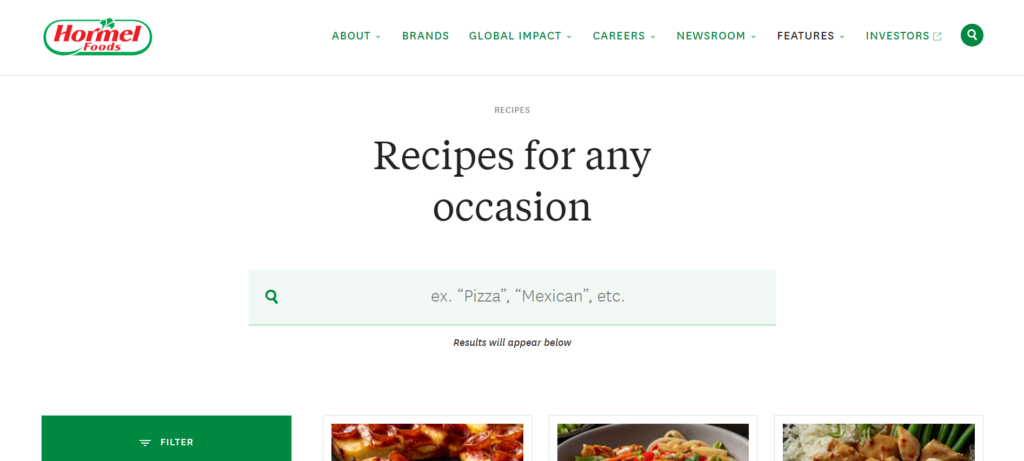
Hormel has leveraged social media platforms to amplify its recipe and content marketing efforts. The company’s YouTube channel, “Hormel Foods” features video tutorials and cooking demonstrations using Hormel products. In 2020, during the COVID-19 pandemic, Hormel launched the “Hormel Foods At Home” series on YouTube, providing easy-to-follow recipes for consumers cooking more at home. This timely content not only addressed a pressing consumer need but also reinforced Hormel’s brand presence during a challenging time. Additionally, Hormel has collaborated with food influencers and bloggers to create and share recipes featuring its products, extending its reach to diverse audiences. For example, the company partnered with popular food blogger “Pinch of Yum” to create recipes using Hormel’s Natural Choice® deli meats, which were shared across various social media platforms.
Hormel’s content marketing strategy extends beyond recipes to include lifestyle content and educational materials. The company’s “Inspired Fan“ blog covers topics ranging from nutrition tips to party planning ideas, all incorporating Hormel products. Furthermore, Hormel has created interactive content experiences to engage consumers. For instance, the Justin’s brand, known for its nut butters, launched a virtual “Ingredient Inspection” tool on its website, allowing consumers to explore the sourcing and quality of ingredients used in its products. This type of content marketing not only educates consumers but also builds trust and transparency around Hormel’s brands, fostering stronger consumer relationships and brand loyalty.
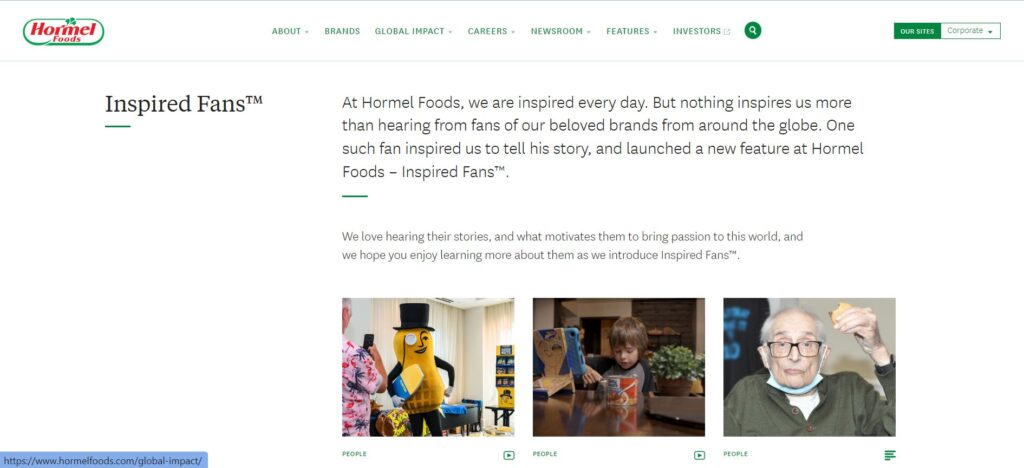
6. Strategic Acquisitions and Partnerships
Hormel Foods has strategically used acquisitions and partnerships as a key marketing strategy to expand its product portfolio, reach new markets, and strengthen its brand presence. One of the most significant acquisitions in recent years was the purchase of Planters from Kraft Heinz for $3.35 billion in 2021. This acquisition, the largest in Hormel’s history, instantly made Hormel a leader in the snack nut category and provided access to a well-established brand with strong consumer recognition. The Planters acquisition not only diversified Hormel’s portfolio but also complemented its existing protein snacking products, allowing for cross-promotional opportunities and expanded shelf presence in retail stores.

Hormel has also made strategic acquisitions to tap into growing market segments and appeal to changing consumer preferences. In 2015, Hormel acquired Applegate Farms for $775 million, marking its entry into the organic and natural meat market. This acquisition allowed Hormel to cater to health-conscious consumers and expand its presence in the natural foods sector. Similarly, the acquisition of Columbus Manufacturing Inc. in 2017 for $850 million strengthened Hormel’s position in the premium deli meat category. These acquisitions have enabled Hormel to quickly gain market share in growing segments without having to build brands from scratch, effectively accelerating its marketing efforts in these areas.
Partnerships have also played a crucial role in Hormel’s marketing strategy, allowing the company to leverage external expertise and reach new audiences. In 2019, Hormel partnered with Better Meat Co. to develop new mycoprotein-enhanced products, demonstrating its commitment to innovation in the plant-based protein space. This partnership has allowed Hormel to respond to the growing demand for alternative proteins while maintaining its core strengths. Additionally, Hormel has formed strategic partnerships with retailers to create exclusive product lines. For instance, the company collaborated with Walmart to launch the “Hormel Gatherings” line of party trays, exclusively sold at Walmart stores. This partnership not only secured premium shelf space but also created a unique offering tailored to Walmart’s customer base. Through these strategic acquisitions and partnerships, Hormel has been able to rapidly expand its market presence, diversify its product offerings, and stay ahead of consumer trends, all of which contribute to a robust and adaptive marketing strategy.
Conclusion
Hormel Foods has built a multi-faceted marketing strategy that blends innovation, sustainability, and health-consciousness while remaining true to its core values of quality and trust. Through brand diversification, a focus on sustainability, strong digital engagement, and strategic acquisitions, Hormel Foods has successfully positioned itself as a global leader in the food industry. This comprehensive approach enables the company to meet the diverse needs of modern consumers while staying relevant in an increasingly competitive and health-conscious market.
Marketing Mix of Hormel Foods
Hormel Foods has effectively utilized the Marketing Mix (4Ps) to build its brand and ensure long-term success. This approach involves Product, Price, Place, and Promotion, with each element tailored to meet the needs of diverse consumers while maintaining the company’s core values of quality, sustainability, and innovation. Let’s explore each element of Hormel Foods’ marketing mix in extreme detail.
1. Product
At the heart of Hormel Foods’ marketing strategy is its diverse product portfolio, which covers various categories like packaged meats, prepared foods, grocery products, and health-focused items. Hormel Foods manages a wide range of household-name brands, including SPAM®, Jennie-O, Skippy, Applegate, and Justin’s, each catering to specific consumer needs and preferences.
Product Variety:
- Packaged Foods and Meat Products: Hormel offers a vast selection of meat-based products like bacon, sausages, turkey, hams, and luncheon meats. Its Jennie-O brand is known for lean turkey products, while Hormel® Natural Choice® offers premium, preservative-free deli meats.
- Nut Butters and Snacks: With brands like Skippy and Justin’s, Hormel has a significant presence in the nut butter category, catering to health-conscious consumers seeking high-protein, low-sugar alternatives.
- Health and Organic Products: As part of the growing trend toward organic and natural foods, Hormel has expanded into healthier categories with brands like Applegate, which markets organic, antibiotic-free, and humanely raised meat products.
- International Products: In response to global demand, Hormel has also expanded internationally with products like SPAM®, which has gained massive popularity in markets such as Asia and the Pacific Islands.
Product Innovation:
Hormel Foods is dedicated to product innovation as a key driver of growth. It has invested in creating new products that meet changing consumer preferences, such as healthier, plant-based alternatives. The company’s Happy Little Plants® brand is an example of its foray into the plant-based protein market. This innovation ensures that Hormel remains relevant amid the rising trend toward plant-based diets and sustainability.
Packaging and Quality:
Hormel pays close attention to the packaging of its products to ensure convenience, sustainability, and appeal. Many of its products are packaged for easy preparation and consumption, with resealable, microwave-friendly designs that appeal to modern, busy consumers. Additionally, Hormel emphasizes the quality and freshness of its products, which are free from harmful additives and preservatives in certain categories, such as Applegate’s natural line.
2. Price
Hormel Foods employs a competitive pricing strategy that balances quality and value for its wide-ranging customer base. As a global player with products in both premium and mass-market segments, Hormel tailors its pricing to meet diverse consumer expectations.
Premium Pricing for Niche Products:
For its organic, natural, and premium products, such as Applegate and Justin’s, Hormel employs a premium pricing strategy. These products cater to health-conscious and ethically driven consumers who are willing to pay a higher price for organic, natural ingredients, ethical sourcing, and sustainable practices. The high price reflects the quality of ingredients and the transparency of the production process.
Value Pricing for Mass-Market Items:
In contrast, SPAM® and other mainstream products are priced to appeal to cost-conscious consumers, especially in markets where affordability is critical. Hormel ensures that its flagship products remain accessible to middle-income households by maintaining competitive pricing across its categories. Price bundling and discount promotions are also common for these products, particularly in retail outlets and during the holiday season, when consumers are seeking budget-friendly options.
Flexible Pricing Strategy:
Hormel uses flexible pricing for different markets. For example, in the United States, where organic and health-conscious foods are in demand, pricing for brands like Applegate might be higher than in markets where cost is a primary concern, like certain Asia-Pacific regions where SPAM® dominates. Localized pricing helps Hormel stay competitive across different geographic regions, while also maximizing profitability.
3. Place
Hormel Foods has an expansive and strategic distribution network that ensures its products are widely available across a multitude of channels, both domestically and internationally. Hormel focuses on omnichannel distribution, leveraging traditional retail, foodservice outlets, and e-commerce to reach its target customers.
Retail Channels:
Hormel’s products are available in nearly every major grocery store, supermarket, and wholesale club. Stores like Walmart, Target, and Costco carry a full range of Hormel products, making them accessible to a broad audience. These retail outlets are essential for brand visibility and customer reach, particularly for mass-market products like SPAM® and Skippy.
Foodservice Channels:
Hormel also distributes its products through foodservice channels, catering to restaurants, cafes, hotels, and institutional buyers such as schools and hospitals. Jennie-O’s turkey products, for instance, are widely used in foodservice for meal programs that need to meet certain nutritional standards. The foodservice channel helps Hormel penetrate institutional markets while reinforcing brand trust through professional kitchens.
E-commerce and Direct-to-Consumer:
Recognizing the growth of online shopping and the demand for convenience, Hormel has increasingly invested in e-commerce channels. Hormel products are available for purchase through major online grocery platforms such as Amazon, Walmart, and Instacart, allowing consumers to shop from the comfort of their homes. The COVID-19 pandemic accelerated the shift to online shopping, and Hormel has responded by ensuring its products are readily available through digital platforms.
Global Distribution:
Hormel Foods has a strong international presence, with operations in markets across Asia, Europe, and Latin America. The company uses localized distribution strategies to adapt to regional markets. For instance, SPAM® is especially popular in the Asia-Pacific region, and Hormel tailors its supply chain and distribution tactics to meet the preferences of local consumers, offering varieties that suit specific cultural tastes. Strategic partnerships with local distributors and retailers enable Hormel to expand its international reach efficiently.
4. Promotion
Hormel Foods’ promotional strategy revolves around building trust, communicating its commitment to quality, and using diverse platforms to engage with customers. The company leverages a combination of advertising, public relations, content marketing, influencer partnerships, and digital marketing to maintain strong brand awareness and customer loyalty.
Advertising:
Hormel employs traditional advertising campaigns across television, radio, and print media to reach its target audience. The company frequently uses ads that emphasize family values, convenience, and the versatility of its products. For example, Jennie-O’s ad campaigns highlight the health benefits of turkey as a lean meat option, promoting it as a healthier alternative to other proteins.
Digital and Social Media Marketing:
Recognizing the shift toward digital platforms, Hormel has ramped up its social media presence to engage with a younger audience. Brands like SPAM® have gained considerable traction on platforms like Instagram, TikTok, and YouTube, where Hormel encourages user-generated content and viral trends. By partnering with influencers and content creators, Hormel has been able to boost its visibility, particularly among millennials and Gen Z consumers.
Content Marketing and Recipes:
One of Hormel’s strongest promotional tools is its focus on recipe and content marketing. The company regularly shares recipes featuring its products across its website, social media platforms, and partnerships with food bloggers and chefs. This approach positions Hormel as a trusted resource for meal planning while encouraging consumers to use its products in creative ways. Recipe content is particularly crucial for versatile products like SPAM®, which can be incorporated into various cuisines worldwide.
Public Relations and Corporate Responsibility:
Hormel Foods places a strong emphasis on corporate social responsibility (CSR) and uses PR campaigns to promote its efforts in areas like sustainability, ethical sourcing, and community engagement. The company’s Hormel® Inspired Pathways Program, which provides free college education to employees and their families, is an example of how Hormel integrates its employee care initiatives into its broader marketing narrative. By promoting these initiatives, Hormel strengthens its reputation as an ethical, community-oriented company.
Sponsorships and Events:
Hormel Foods also participates in community events and sponsorships that align with its brand values. These efforts help enhance brand visibility and reinforce its commitment to health, wellness, and community well-being. For example, Jennie-O sponsors events that promote healthy eating habits, while Applegate supports causes related to animal welfare and ethical farming.
Hormel Foods’ marketing mix is a carefully crafted blend of product innovation, competitive pricing, expansive distribution, and targeted promotions. By leveraging its diverse product portfolio, focusing on sustainability, and utilizing omnichannel marketing strategies, Hormel has built a strong brand presence across various markets. Its emphasis on product quality, adaptability, and corporate responsibility ensures that it continues to resonate with modern consumers while maintaining a competitive edge in the food industry.
Also Read: Exploring Marketing Strategies of Whataburger
To read more content like this, subscribe to our newsletter

